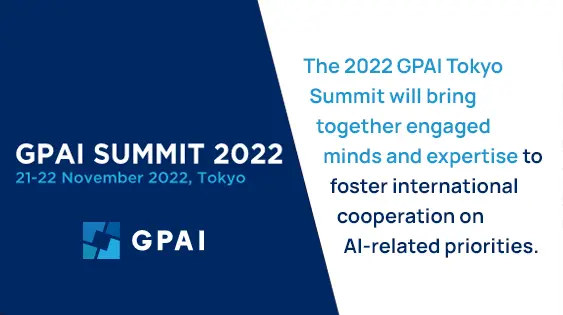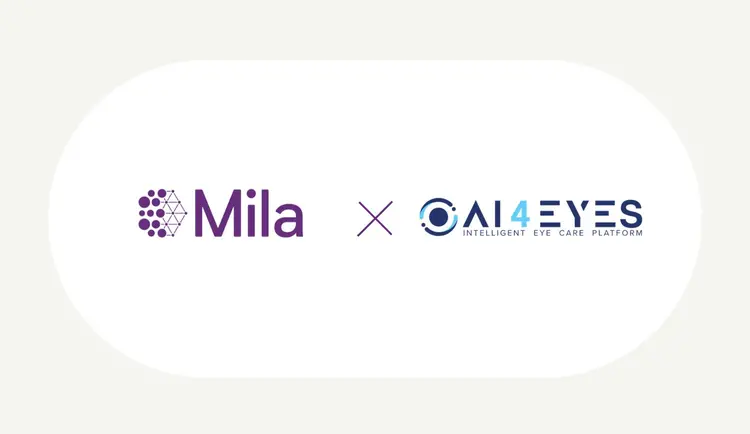
On November 21-22, the Global Partnership on Artificial Intelligence (GPAI) holds the third edition of the GPAI Summit in Tokyo, Japan, which focuses on four main themes: responsible artificial intelligence (AI), data governance, future of work and innovation and commercialisation.
Launched in June 2020, the GPAI brings together engaged minds and expertise from science, industry, civil society, governments, international organizations and academia to foster international cooperation and bridge the gap between theory and practice on AI, goals that are shared by Mila. Several members of the Mila community are taking part in the GPAI Summit, here is a summary of the different scheduled talks involving them.
Presentation of the Responsible AI Working Group Report - Catherine Régis
Last January, Catherine Régis, full professor at the University of Montréal Law Faculty, Mila Associate Academic Member and a Canada Research Chair, was named co-chair of the Global Partnership on Artificial Intelligence Working Group on Responsible AI (RAI). As part of the 2022 GPAI Summit, she presents the Responsible AI Working Group Report co-signed by the RAI’s other co-chair Raja Chatila, Director of the SMAR Laboratory on Human-Machine Interaction, Sorbonne University.
This document highlights the RAI’s progress our four verticals that closely align with GPAI Council top priorities:
- Responsible AI Strategy for the Environment (RAISE) presents how AI can be responsibly developed, used and governed to take on the fight against climate change including biodiversity preservation.
- Responsible AI for Social Media Governance which focuses on improving understanding of social media users’ relationships with harmful online content, by developing methods allowing governments and citizens’ groups to work collaboratively with social media companies, and study the effects of recommender systems.
- AI for public-domain drug discovery that responds to international demand from governments to find ways to accelerate drug discovery more broadly.
- Pandemic Resilience directly supports impactful and practical AI initiatives to help in the fight against pandemics.
Click here to read the full report: https://gpai.ai/projects/responsible-ai/gpai-responsible-ai-wg-report-2022.pdf
The Enhanced Drug Discovery Ecosystem: Leveraging AI, International Partnerships, and Innovative Funding Structures - Yoshua Bengio, Allison Cohen and Elliot Layne
As part of a panel hosted on Monday, November 21, Allison Cohen, Senior Applied AI Projects Lead, AI for Humanity at Mila presented the AI for Public Good Drug Discovery: Advocacy Efforts and a Further Call to Action Report which Yoshua Bengio, Mila’s Scientific Director and Founder and Elliot Layne, PhD Candidate - McGill University, School of Computer Science & Mila also co-wrote.
This document presents an update on the progress made by the AI for Public Good Drug Discovery Project Advisory Group following the publication of the 2021 GPAI report, Artificial Intelligence for Public Good Drug Discovery: Recommendations for Policy Development which described the significant market failure in the domain of drug R&D that is preventing meaningful investment in high priority research areas and its associated risks. Long term, the goal of the Advisory Group is to develop an institutional framework that connects AI resources with the R&D ecosystem in order to proactively address critical public health care challenges, including the rise of antimicrobial resistance and the threat of future pandemics.
Click here to read the full report: https://gpai.ai/projects/responsible-ai/AI-for-public-good-drug-discovery.pdf
Diversity and Gender Equality in AI: Pathways to Address Systemic Changes - Benjamin Prud’homme
On Tuesday, November 22, Benjamin Prud’homme, Executive Director, AI for Humanity at Mila, will take part in a discussion aiming to promote systematic application of gender approaches that will challenge and transform gender inequality at all levels of AI ecosystems. The panelists will seek to explore and understand how current challenges manifest in different levels of ecosystems and types of organizations, determine which practices have created significant impact, and discuss how mobilizing intersectional approaches is essential in ensuring that representation from the Global South increases in the international AI ecosystem.
Click here to learn more: https://gpai.tokyo-2022.go.jp/side-event/se-expert9.html





